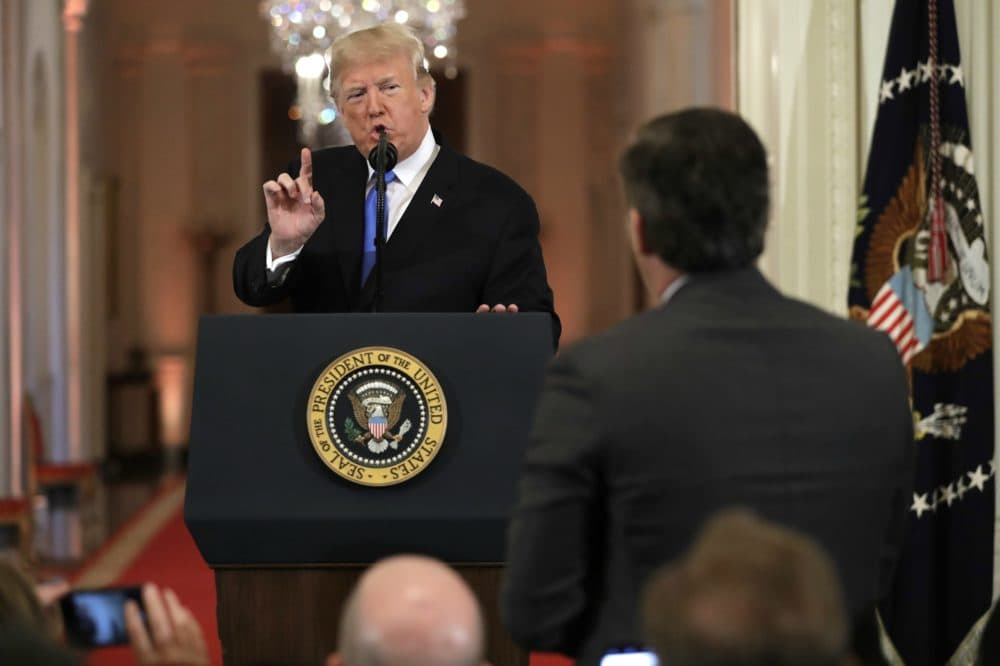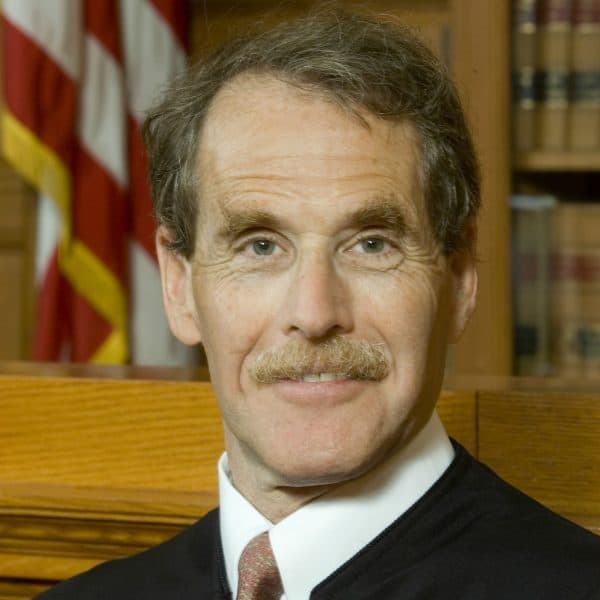Advertisement
Commentary
Trump's Attacks On The Press Only Strengthen The First Amendment

At the height of the Watergate scandal, Richard Nixon embarked on a nationwide tour to defend his presidency and salvage his reputation. Just as Donald Trump is careful to surround himself with crowds of supporters, Nixon cherry-picked his venues. But Nixon’s plan wasn’t perfect, as he discovered when he appeared before what he expected to be a friendly audience in Houston.
Among those in Houston’s Jones Hall on March 19, 1974 was Dan Rather, White House correspondent for CBS News. Nixon had indeed selected a friendly setting, and there were audible boos from the crowd when Rather introduced himself. Emboldened, and before Rather could proceed, the president asked, “Are you running for something?” After the applause and laughter had subsided, Rather replied in a politely questioning tone, “No sir, Mr. President. Are you?”
This exchange, downright quaint by today’s standards, was hotly debated at the time as an inexcusable breach of decorum. Two recent events, both related to the current administration’s determination to discredit the media, illustrate that much has changed.
Recently the White House revoked CNN reporter Jim Acosta’s press pass after Acosta persisted in questioning Trump about both the Mueller investigation and the migrant caravan he has called an “invasion.”
The exchange featured an uncouth and insulting Trump deriding a reporter who refused to sit down or yield the floor when the president demanded he do so. Acosta’s demeanor was camera-conscious and outwardly polite, so much so that the White House felt it necessary to doctor the resulting film clip.
CNN, which received vocal support from every major news outlet (including Fox News), promptly filed suit and obtained a temporary court order requiring Acosta’s pass to be returned. The administration, under fire from all sides of the political spectrum for attempting to prevent inconvenient questions from the press, capitulated.
The president is not legally obligated to talk to anyone. While it is sadly inconceivable that Donald Trump will ever avail himself of this freedom, he could choose to give no press conferences whatsoever without violating any constitutional precepts. Alternatively, whenever press conferences are conducted, neither the president nor any other government official is obligated to call on a particular journalist.
Advertisement
The court order that CNN obtained was based on the fact that Acosta, who had been in possession of a pass, was given no Fifth Amendment due process opportunity to address claims of improper conduct. The First Amendment is partly relevant to the dispute because Trump has been unwisely explicit in revealing that his attacks on the press are content-based.
The administration was smart to cut its losses, and now has announced plans to formulate a code of conduct for press briefings. We can expect a continuing fight between the press, asserting established norms, and an administration that intends to construct a process designed to maximize control over bothersome reporters.
The other recent signpost of how much has changed came when the White House Correspondents Association, breaking with tradition, announced that the keynote speaker at this year’s annual dinner will not be a comedian.
For years these dinners have provided sharp-witted criticism of the sitting president and other politically powerful figures, sitting just a few feet from the speaker. Last year’s address by Michelle Wolf was exceptionally sharp and barely disguised as humor. Wolf’s routine, like the revocation of Acosta’s press pass, drew bipartisan disapproval.
Calvin Coolidge, who once observed that the "words of a president have an enormous weight and ought not to be used indiscriminately," was the first commander-in-chief to attend this annual ritual, which dates from 1921. It provides presidents with the opportunity to demonstrate that they are good sports, and also that they can reply in kind. Like press briefings, the dinner has become a norm.
Donald Trump has not attended since he assumed office. He won’t be going this year either, even though the challenge for him to laugh at himself and then dish it back has been removed from the program. Instead of a comedian, the Correspondents Association has booked historian Ron Chernow as keynote speaker. The change incited criticism that the Association has been intimidated by Trump’s disparagement of the press in general, and the annual dinner in particular.
The change is actually a good decision. It’s admittedly daunting for a president to run the gauntlet of today’s unrestrained stand-up comedy. But an historian, and especially one with the credentials of Chernow, presents a far more serious threat to the self-importance of any public figure.
The progression ... represents a coarsening of public discourse, but also a strengthening of First Amendment norms -- the two often go hand in hand.
While Chernow is celebrated for his biography of Alexander Hamilton (and the resulting Broadway smash hit), his recent biography of Ulysses Grant is a more pointed celebration of qualities conspicuously absent in our current president. Chernow recounts a New York Times editorial of July 24, 1885, just a few months after Appomattox:
“If a great soldier is indomitable in purpose and exhaustless in courage, endurance and equanimity; if he is free from vanity and pettiness, if he is unpretentious, truthful, frank, constant, generous to friends, magnanimous to foes, and patriotic to the core, of him it will be said, ’He is like Grant.’”
Needless to say, historical references such as this one, delivered with scholarly detachment, are far more damaging than the snarky one-liners we have come to expect at the average dinner roast. This president may lack a sense of history, but he is keenly sensitive to even the slightest criticism in any context, including historical.
The progression from Dan Rather through Jim Acosta to Michelle Wolf represents a coarsening of public discourse, but also a strengthening of First Amendment norms — the two often go hand in hand.
The Acosta encounter presents a familiar scenario with a president who pursues confrontation, as long as it’s on his own terms. We aren’t likely to return to the genteel days of Dan Rather. But at least on this occasion, the Correspondents Association has found a way to sidestep schoolyard insults, and maintain a focus on freedom of the press.


